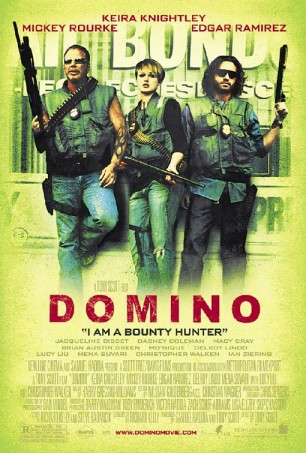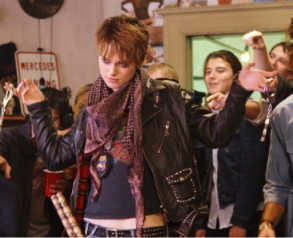|
Domino
Domino
is not nearly as good as it wants to be.
Visually,
director Tony Scott weaves an assault to the senses, channeling
the worst of Oliver Stone and Guy Ritchie, think U-Turn,
Natural Born Killers and Snatch rolled together
into an aesthetic train wreck of epic proportions. However,
Domino manages to be more than any of those three
films combined, and it has its screenplay to thank.
Richard
Kelly, the wunderkind most commonly referred to in relation
to his directorial debut, Donnie Darko, has crafted
a script that should, by all intents and purposes, play
out in the typical biopic fashion, with one catch: it doesn’t.
See, Kelly is too smart for that, and it would seem that
he realizes the futile nature of biographical films better
than the studios intended to capitalize from them, and he
poses this in a simple question.
Who was Domino Harvey?
The answer is simple in that no one really,
truly, knows who anyone is. Yes, its amazingly existential,
and actually downright cynical, but in the end, it is the
truth in regards to the subject at hand. Sure, anyone that
has read the gossip columns and rumor mills has read a variation
of the same story regarding the model turned bounty hunter.
Kelly’s screenplay uses this as its
jumping off platform and entry point into Domino’s
problematic and chaotic life, but it quickly jumps the rails,
using fiction to contrast what could be fact with what is
absurd and impossible, yet ultimately entertaining.
What destroys all of this from succeeding
is Tony Scott’s apparent need to enunciate each note
with hyper stylized celluloidal ejaculation. Every saturated
color filter, grain enhancement, and flash cut editing tactic
is employed here, ad nauseam, and it succeeds only in overstating
every beat along the way.
The film is framed with an interrogation
between Domino Harvey (Keira Knightley) and an FBI agent
named Taryn Miles (Lucy Liu). Through this interrogation,
we learn of events leading up to Domino’s crucial
career choice, and ultimately to a job so fiendishly full
of double-crosses and entanglements that she wound up on
the verge of a lengthy prison sentence.
Or so we think.
The
story is told in disjointed flashbacks, detailing moments
in Harvey’s past ranging from her mothe'rs decisions
to place her in boarding school and force her into life
in Beverly Hills. Both of these incidences, coupled with
the death of her father, forced Harvey to build an emotional
shell used to protect her from feeling anything near bonding
with anyone at all.
It’s
only natural that she turn to a life of violence after rejecting
a life as a model, depicted quickly with a sequence of her
strutting down the runway next to an overlaid title card
reading “I am bored” right before pummeling
another model with a flurry of punches.
She joins up with a band of merry bounty
hunters named Ed (Mickey Rourke) and Choco (Edgar Ramirez)
and immediately is thrust into a life of hunting humans
for a living, often at risk of gunfire and standoffs against
South Central L.A. gang bangers. Just such a situation calls
for quick thinking, and Domino proves her mettle by handling
the situation with a lap dance.
In the end, we wind up with a pair of outrageous
cameos in Brian Austin Green and Ian Ziering, both playing
themselves, a visit to the Jerry Springer Show, a heist
involving the mob and a Las Vegas casino owner (Dabney Coleman),
and a drug induced appearance by an angelic Tom Waits.
The
finished film is a mess and the ending is especially reminiscent
of Scott’s own True Romance, a film whose visual style
managed to dance delicately around the screenplay by Quentin
Tarantino, who had yet to make a name for himself in the
industry at the time of the films production. Unfortunately,
Scott chose to outshine his writer with Domino,
and the results are catastrophic.
Rating:

|







